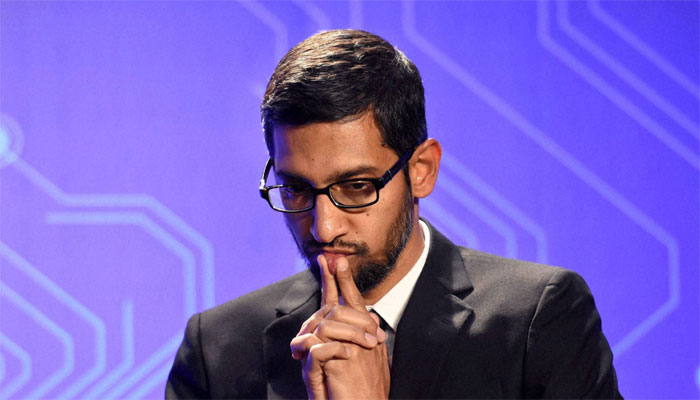 POLICY
POLICY
 POLICY
POLICY
 POLICY
POLICY
Google LLC Chief Executive Sundar Pichai today announced that the internet giant will spend more than $175 million on racial equality initiatives, with the main focus on financing black-owned businesses and supporting black entrepreneurs.
The funding was announced alongside various other changes and commitments aimed at supporting equality and combat anti-black racism.
Pichai (pictured) said in a blog post the $175 million funding is part of an “economic opportunity package” that will be split four ways. The bulk of the funds, $100 million, will be used to support black-led startups, venture capital firms and organizations that are led by black entrepreneurs, the CEO said. The company will also commit an additional $50 million to be used as financing and grants for small businesses focused on the black community.
In addition, Google is donating $15 million for training programs for black job seekers, which it says will be operated by partner firms. Some $10 million will be used to support black developers through access to better education, equipment and economic opportunities, Pichai said. And there’s an additional $3 million that Google will use to support black students, focusing on early computer science education.
Google’s commitments come in response to the widespread protests that erupted following the death of George Floyd, who was killed by a white police officer in Minnesota during an arrest. The protests have prompted many U.S. companies to see what they can do to increase support and opportunities for the black community, and fight racism in general.
Earlier this month, Google said it was donating an initial $12 million to fight racial inequality. Other technology firms, including Amazon.com Inc. and Facebook Inc., have also made substantial donations. Meanwhile, Apple Inc. last week announced a $100 million program it calls the Racial Equity and Justice Initiative.
Google isn’t stopping at throwing money at the cause, though. Pichai said the company would also make changes within its own organization to support black employees and promote black representation. It’s committing itself to hiring more black employees to its senior leadership teams, and it says it will increase representation of underrepresented groups within its leadership by 30% by 2025.
Google’s 2020 diversity report, published earlier this year, said white employees account for 65.9% of leadership roles within the company in the U.S., while Asian employees make up 29.6% of its number. In comparison, black employees fill just 2.6% of its leadership roles.
“Creating meaningful change starts within our own company,” Pichai wrote in a memo sent to the company. “Strengthening our commitment to racial equity and inclusion will help Google build more helpful products for our users and the world.”
Google will also do more to boost hiring, retention and promotion of people from underrepresented groups. In addition, the company will work to create a “stronger sense of inclusion and belonging” for black employees, Pichai said. For example, Google will end its policy of asking employees to monitor for unauthorized visitors walking through its office doors without swiping through.
“We have realized this process is susceptible to bias,” Pichai said, adding that the company will use other security checks instead.
Lastly, the company will create new anti-racism training programs that will be scaled up for its entire workforce. Google recently came in for criticism by some of its own employees, who said that the company has scaled back its diversity and inclusion programs. Google said it did so because some programs couldn’t be scaled across its entire organization.
Google’s new diversity policies were welcomed by analyst Holger Mueller of Constellation Research Inc., who said it was good to see the company working to reduce racism in the workplace and offer education and investment opportunities to disadvantaged groups.
“What’s remarkable is Google’s goal to increase diversity with a yardstick to measure on, which is more than most enterprises are ready to commit to,” Mueller said. “One can only hope that all these actions lead to change in our society, where there isn’t any room at all for racism in 2020 and beyond.”
Charles King of Pund-IT Inc. agreed it was good to such an initiative from a company that’s hugely influential both socially and culturally. But he said the company has lots of work to do to improve its track record when it comes to diversity.
“While Google has been trying to move the needle in terms of supporting, placing and promoting worthy women and minority employees, the results have been incremental and attrition rates among black and Latino employees remain significantly higher than average,” King said.
Not everyone was quite so enthusiastic. Rob Enderle of the Enderle Group told SiliconANGLE that Google could do much more besides throwing money at the problem.
“If Google genuinely wanted to make a difference, it would use its technology and resources to protect black jobs, black reputations and particularly black children,” Enderle said. “It would more aggressively work to eliminate false stories surrounding black lives matter rallies, demonstrations, and use its voice and technical capabilities to help people of color achieve better lives.”
YouTube, which is owned by Google, has separately announced a $100 million fund that will go toward supporting black content creators.
Support our mission to keep content open and free by engaging with theCUBE community. Join theCUBE’s Alumni Trust Network, where technology leaders connect, share intelligence and create opportunities.
Founded by tech visionaries John Furrier and Dave Vellante, SiliconANGLE Media has built a dynamic ecosystem of industry-leading digital media brands that reach 15+ million elite tech professionals. Our new proprietary theCUBE AI Video Cloud is breaking ground in audience interaction, leveraging theCUBEai.com neural network to help technology companies make data-driven decisions and stay at the forefront of industry conversations.